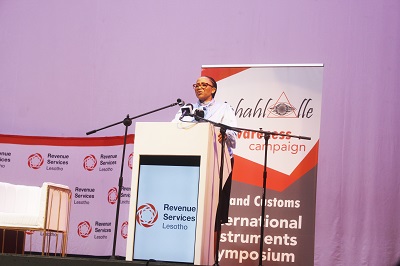By: Mpho Shelile
Revenues Services Lesotho (RSL), through its awareness campaign Mphahlolle held a one day symposium at Manthabiseng Convention Centre last week with the aim of highlighting, creating awareness and giving guidance to private sectors and business people about tax and customs international instruments and on how to access and benefit from such instruments.
Giving the keynotes address, Minister of Finance and Development planning Dr. Retšelisitsoe Matlanyane specified that Basotho are gifted with various natural resources like: land and water but they are not using them to their full potential.
She went on to indicate that during one of her travels between Maseru to Mafeteng not even once did she come across a farmer on the field while in other countries farmers are up and about working on their fields to produce enough to eat and trade.
“We have embarked on a journey to make sure that Lesotho grows economically through agriculture but are private sectors preparing markets for such goods? Questioned Dr. Matlanyane adding that there should be an already available market for such goods since they are perishable. Basotho farmers are trying by all means to try and grow as many goods as possible only for them to stand on the side roads selling their products and making losses because there is not enough market for their products emphasised Dr. Matlanyane.
Dr. Matlanyane implored all private sectors to ensure that there is enough market where farmers know they are to deliver their produce so that they reach supermarkets, adding that it is their responsibility as government to meet farmers half way and build labs where food can be tested to ensure that they are healthy enough for human consumption.
“Mphahlolle should not be an RSL only initiative”, she advised them to partner up with other private sectors because together they can reach more farmers and business people and give them the kind of knowledge needed to trade. “What we are intending to do is revolutionize trade and the economy in our country and Africa as a whole, there are a number of agreements that the government is a signatory to in Southern African customs union which is a market on its own, we are also in a SADC free trade agreement.” She concluded by stating that she is proud to state that there are places in Lesotho that produce denims that are sold internationally.
Setsoto Ranthocha in his presentation indicated that the campaign aims to create awareness on RSL e-services, products and changes or new developments taking place within the RSL. He stated that so far Lesotho has about 8 agreements in Trade, but the last three have not yet been implemented only still in the pipelines, they are still going through ratification. Mentioning a few countries which Lesotho is in agreements with are: South Africa, United Kingdom, Botswana, Republic of Mauritius and Kingdom of Eswatini etc.
He stated that digital innovations have brought about significant changes in the field of taxation, improving efficiency, transparency, and the ability of tax authorities to enforce compliance. However, they also pose new challenges that require continuous adaptation and regulation.
Top of Form
“Technology has influenced tax processes and compliance,Top of Form
We have the issue of taxation in the digital economy, and it is very big. Traditionally we would wait for someone to open shop at a specific location then we could go and demand tax, but this days everything is done digitally so this are some of the aspects which are being innovated into the tax treaties that we have and we need to adapt to,” he said.
He further stated that they loss an estimated 250 million annually due to digital transformation, adding that it would take RSL decades to try and collect all that money,
He concluded by stating that while digital innovations have brought about numerous benefits, they have also raised concerns related to data security, privacy, and the need for constant updates to tax regulations to keep pace with technological advancements. “As technology continues to evolve, the impact on tax systems is likely to grow, requiring ongoing adaptation and collaboration between tax authorities, businesses, and technology providers,” Said Mr. Setsoto.
In his presentation, Mr. Thebe Kapa the manager of Tariff evaluation and operation systems at RSL indicated that it is very common for people to seek assistance from the government, assist to pursue their projects within the country which in turn will boost the economy of the country. Their duty as RSL is to ensure that the goods produced from such projects get tariff codes in order to make it easy to trade and facilitate international trade by reducing confusion and doubt.
“Tariff codes are critical for ensuring the smooth flow of goods across borders, promoting fair trade practices, and providing a common language for international trade participants, including governments, businesses, and regulatory bodies and providing valuable data for analysis and decision-making,Top of Form” he said.


